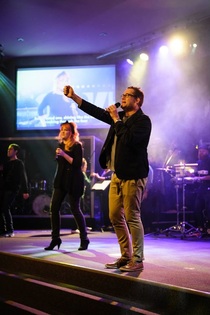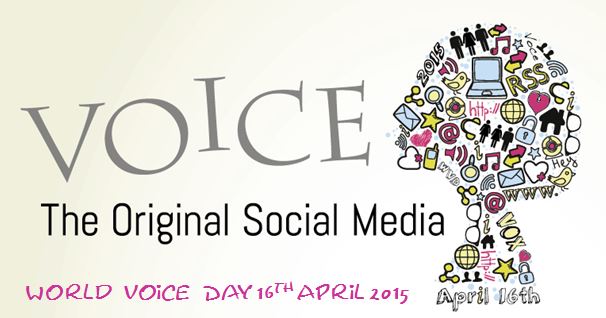find YOUR voice!18/4/2015  Welcome to the very first "Find A Voice" blog; a place where we can talk about how YOU can find the voice you know you have, but haven't quite connected with yet. So many people have untapped talents which are only enjoyed by the bathroom when they're in the shower! I'm really interested in igniting a passion for singing and give people opportunities to develop and use their own unique voice in a setting which is fun and exciting and most importantly not scary! MCChoir aims to provide a means of allowing people to be part of something bigger than themselves and create musical experiences which are enjoyed by audiences in our community and beyond. Unlike solo performance, a choir is about listening to the people around you and blending together to form a united sound which is a great way of approaching singing. It allows us to grow in our vocal without standing out like a sore thumb, because we have the support of everyone around us. Last week I was rehearsing some material in the car for an Anzac Day Concert I will be participating with the Choral institute of Melbourne. At the traffic lights the car next to me had his window down and could obviously hear me enjoying singing a great arrangement of Waltzing Matilda! I was met with boisterous comments of "beautiful" and lots of thumbs up, hand waving and smiles when they finally got my attention. I just wish I had a flyer handy for the concert to give them! Fact is those guys saw something that made them respond. Isn't that what performance is all about - engaging with your audience and creating something memorable for the listener as well as the artist. Isn't that what performance is all about - engaging with your audience and creating something memorable for the listener as well as the artist. I've always enjoyed being part of choirs and vocal ensembles throughout my life and I don't think life would be anywhere near as rewarding if I wasn't using my giftings in a group like that. Not only do I feel a sense of community, my stress levels are managed, my breathing is improved but I have a stronger speaking voice that doesn't wear out by Friday afternoon. Having taught secondary school science and having to use my voice constantly, whilst competing with a class room full of energetic students, I know what it is to put my vocal chords through the ringer. I recall one experienced teacher commenting to me "why haven't you lost your voice yet" when all of the other first year teachers were feeling hoarse. I put it down to knowing how to maintain good vocal health and part of that is good hydration, gentle morning warm-ups vocal exercises and singing regularly in a group to keep my voice ready for whatever it's needed for. In fact tonight I'm going to a Vocal Health Professional Development workshop for "World Voice Day" sponsored by the Australian Voice Association (AVA). Perhaps we can talk about that in another blog post. If your considering the benefits of belonging to a contemporary and relevant choir with opportunities to perform and get to know other people, I would encourage you to click the fill out the 'expression of interest form' on the Join MCChoir page and we will let you know about our first rehearsal which will be coming up soon . It going to be in the form of a MCChoir Vocal Workshop taster. This will allow you to experience the choir and see if the group is something you would enjoy and like to be a part of as a Foundation Member. You don't have to read music or be John Farnham or Olivia Newton John - We'll help you be the best voice you can be and that takes time. Jase Simmonds (Creative Director Melbourne Contemporary Choir - MCChoir)
0 Comments
World Voice day review17/4/2015 Last night I attended my first World Voice Day Professional Development session held at The Library at the Dock, Docklands, hosted by the Australian Voice Association (AVA). What a beautiful spot to get together with other people from the choir scene in Melbourne on a pleasant evening, with the lights of the Melbourne Star glistening on the bay. I wasn’t sure what to expect to be honest, but I'm so glad that I made the effort to go. I had just read about the event on the Australian National Choral Association events page a couple of days before and decided to go.
I was greeted by Bec Tilley, a voice coach based in Brunswick West, who made the first presentation. She made the point that “If you sing, then you’re a singer!” “If you make music, you’re a musician!” So many people don’t see themselves as singers because they don’t think they are good enough or haven’t had formal training, I say not so! “If you sing, then you’re a singer!” “If you make music, you’re a musician!” A student doesn’t pick up a violin for the first time and start playing like Andre Rieu do they? (have you ever heard a beginner violinist – talk about painful!) No offense to those who are learning violin. The point is just like studying an instrument, singing is a craft which is learnt and refined over time with practice. Being part of a choir like Melbourne Contemporary Choir (www.mcchoir.com) can be a great way to develop this skill in a relaxed setting where individual differences are appreciated and people can develop their craft. Singers, like instrumentalists and other musicians have an instrument too – and a very complicated one at that – it just happens to be situated in a very small area in your throat. During the evening Dr Amanda Richards, an ear, nose and throat specialist took us through the complexities of the anatomy of the larynx and the connecting nervous system – (as a scientist myself, I really enjoyed this part - I felt like I was back at uni taking a lecture). I really believe that in order to master voice production, whether you’re singing or speaking - you need to under stand your instrument. "In order to master voice production - you need to understand your instrument". The voice coach, Bec Tilley, touched on what she termed “mouth effort”. As Australians we are generally pretty lazy with our articulation and the amount of movement we make with our mouth when we speak or sing (most Americans can’t understand a word we say!). When we are singing, ‘mouth effort’ can be described on a scale of 1 – 10 where 1 is little or no mouth movement and 10 is very exaggerated mouth movements. First Bec had us sing ‘Happy Birthday’ to one of the participants in the room who’s birthday it happened to be, with a ‘mouth effort’ of three (little effort or movement of the mouth) however she wasn’t feeling very loved at all after our rendition – the sound was dull and uninteresting. We tried it again with a mouth effort of 10 making large mouth movements and the difference in the brightness, volume and energy in the sound production was astounding! Although we felt pretty silly at a ‘mouth effort’ of 10, normally we would aim for a 7 when singing (and still feel a little awkward) but with much better sound production. Try it in front of the mirror – honestly you don’t look as silly as you feel and the sound quality is worth the effort. Another take home message I gained from ‘World Voice day’ is that singers are ‘vocal athletes’. Just like an athlete needs to warm up, stretch, use different muscles, keep well hydrated and warm down, so too the singer does ‘vocal kilometres’. Our vocal folds inside our larynx are colliding at very high speed when we speak and even more so when we sing. Teachers and any professions that use their voice for a living, place high demands on their voice and its worth keeping it healthy. The vocal folds undergo millions of collisions and it’s very much like running a marathon every day for those who of us who use their voice a lot. Singers are ‘vocal athletes’ One helpful analogy which Meaghan Sullivan, with ‘Voice Medicine Australia’ gave was the ‘vocal bucket’ or ‘vocal load’. We each have a ‘vocal bucket’. Every day whilst we are speaking, cheering our favourite footy team on, trying to be heard over background noise in a room, our bucket is being filled. If we are yelling or speaking loudly all the time, our bucket is going to be filled up much more rapidly. It gets to a point where our bucket starts to become overfull and overflows and this is when our voice becomes tired, husky, dry and irritated. Things that can help to maintain a healthy singing voice: - Take a rest from singing when your body is telling you need it - Reduce your vocal load (speaking and singing) - Do an individualized warm up before rehearsals or speaking event - Marking music for some songs in rehearsals instead of singing everything - Practice songs in your head instead of vocalizing it - Lots of gentle voice movement throughout the day - Become a hummer (humming is a great way to condition the voice) - Warm down is just as important as a the warm up (and a great way to ensure you have a voice the next day) - Vibration (bubbles or lip trills) and stretching (vocal sirens) - Counterbalancing – if your singing a lot of high register stuff, finish off with some low Mm, Nn and Ng sounds Meaghan talked about a study she had carried out with 22 Choristers over 5 weeks. One half of the choir did regular “vocal function exercises” as described by Dr Joseph Stemple, the other half of the choir did no exercises at all. She carried out a perceptual assessment at the start and the end of the test including looking at pitch and range and she observed marked improvements in voices of those who completed the exercises. Singers had measurable improvements in flexibility, strength and endurance. I know for myself vocal exercises performed regularly increase my range, strengthen my voice, and ensure my voice can perform for longer periods of time without falling apart. Finally I wanted to remind ourselves that singing is wonderful for vocal health and can help you in your everyday communication and in your work. So why not give a choir like Melbourne Contemporary Choir a go, you’ve got nothing to lose and everything to gain. I would also encourage you to participate in future World Voice Day events. This one was certainly cram packed with information - far too much to share in this blog. Melbourne Contemporary Choir "a place where people find a voice!" AuthorJason or (Jase) as he likes to be called is Founder & Creative Director of Melbourne Contemporary Choir (MCCHOIR) and is a passionate musician who wants to bring his love for music to a broader audience. Archives
March 2019
Categories |
FIND MCCHOIR AT:
|
CONTACT USCall us: 0400 242 893
Email: [email protected]
FOLLOW & SHARE US |
MCCHOIR EST. MMXV | Copyright © 2022 Melbourne Contemporary Choir, All Rights Reserved. All images subject to copyright.

